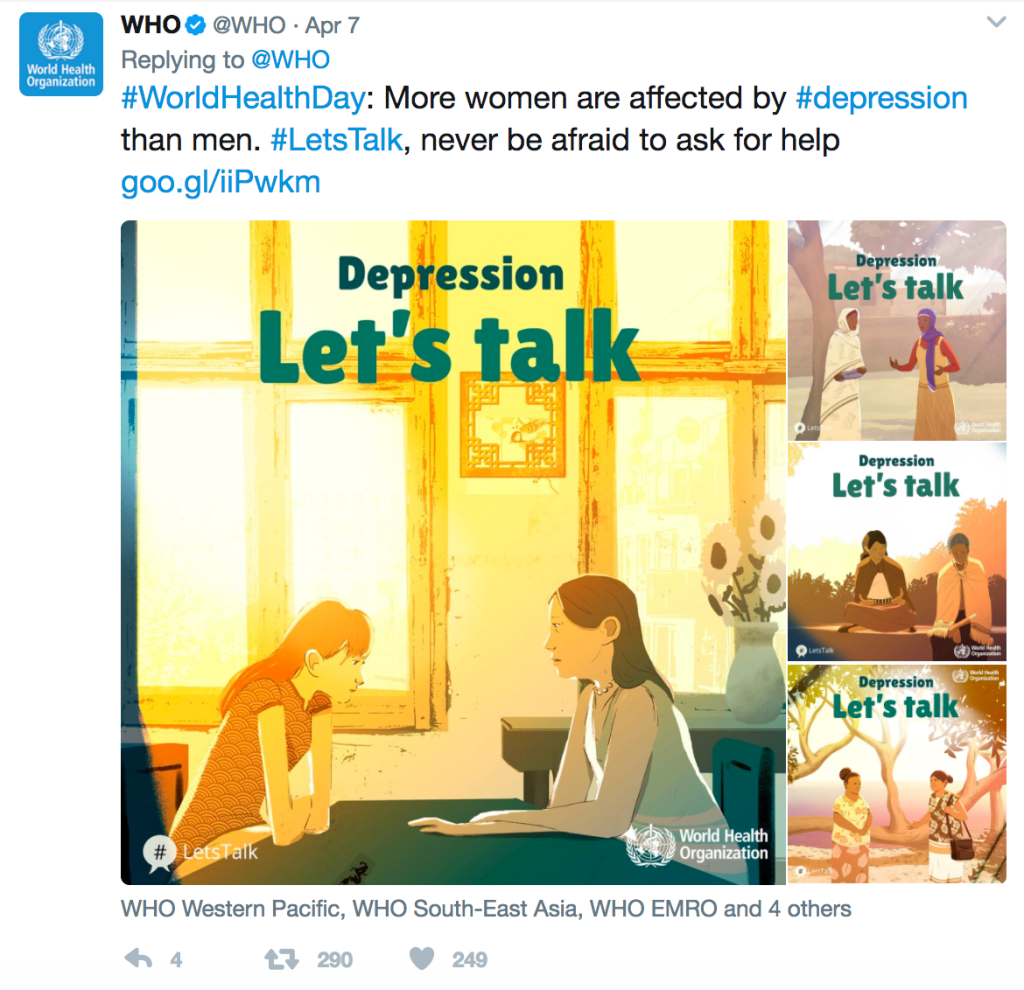Advice On How To Recognize And Overcome Your Depression

Women experience depression at twice the rate as men in today’s society, according to Mental Health America. In fact, a new study conducted by the National Health Service (NHS) reveals that psychological distress in young women between the ages of 16 and 24 is rising, with record numbers of women admitting to harming themselves. With 12 million women in the US suffering from depression and 300 million people worldwide affected by this harmful disease, it’s about time The World Health Organization (WHO) prioritized depression as this year’s top health concern.
This past Friday, The World Health Organization celebrated the high-point of its campaign to raise awareness of depression, called “Let’s Talk: Depression.” The goal of the campaign is to destigmatize depression and to encourage people all around the world to seek and get help.
There are still many misconceptions surrounding depression and mental illness among women. For instance, more than one-half of women believe it is “normal” for a mother to feel depressed for at least two weeks after giving birth. More than one-half of women cited denial as a barrier to treatment, while 41% of women have noted that embarrassment or shame kept them from getting treatment.
Although it’s normal to experience mood fluctuations and short-lived emotional responses to everyday challenges, there is nothing normal about depression. Depression is a medical disease that is characterized by sadness, feelings of hopelessness and worthlessness, low self-esteem, loss of interest, feeling tired, and poor concentration. In severe cases, depressed persons can have suicidal thoughts and some may try to take their life.

Depression can range from mild, moderate, to severe. Maybe you don’t suffer from suicidal thoughts or loss of interest in everyday activities, but you still can experience low self-esteem and feel tired all the time. It’s important recognize these traits and ask for help.
Fortunately, clinical depression is a treatable illness. In fact, more than 80% of people with depression can be treated successfully with medication, therapy or a combination of both.
Here are a few steps that can help put you back on the road to recovery:
1. The first step on the road to recovery is recognizing that you have depression. Sometimes it’s pretty easy to tell something isn’t right, but other times it may be harder to differentiate between the “blues” and depression. Everyone may get the “blues” when they lose a job, go through a bad breakup, or experience the loss of a loved one. Most of the time these feelings are temporary and do not disrupt your health and general ability to function.
2. If you know you are suffering from depression, tell someone you trust. The Director of the Department of Mental Health and Substance Abuse at WHO advises, “For someone living with depression, talking to a person they trust is often the first step towards treatment and recovery.”
In fact, it’s vital not to isolate yourself. When you have depression, your thoughts are distorted and they may tell you not to bother others with your problems. Try to ignore these irrational thoughts that prevent you from seeking help.
3. See a Therapist. There is no shame in recognizing that you have a problem that you cannot solve on your own. Seeking out professional help can be enlightening and educational, providing tools and coping mechanisms that can help you challenge and overcome your depression.
One of the most well-researched and effective forms of modern therapy is Cognitive Behavioral Therapy (CBT). For instance, in cognitive-behavior therapy, you learn to become an observer of your thoughts and to challenge negative thinking patterns that are self-destructive and counterproductive.

4. Stay Active. Exercise may be the last thing you want to do, but staying active is psychologically proven to improve your mood and help you fight depression. I know of people who told me that one of the only things that helped their chronic depression was exercise. Working out can be as simple as taking the dog on a walk around the block. Just find a way to get your blood pumping and your body moving.
5. Don’t punish yourself for feeling bad. It’s easy to be angry at yourself for not feeling “normal.” Remember that you are the victim of a medical disease and that your feelings are not your fault. Attacking yourself for having depression will not only make you feel worse, even more so because it is not your choice!
6. Remember you are not alone. Depression is more common than you may think. One out of every eight women will be diagnosed with clinical depression. It shouldn’t be surprising, therefore, to discover that other women in your social circle have also suffered from depression or psychological distress. Seek out stories from others that have overcame depression and learn from them.






